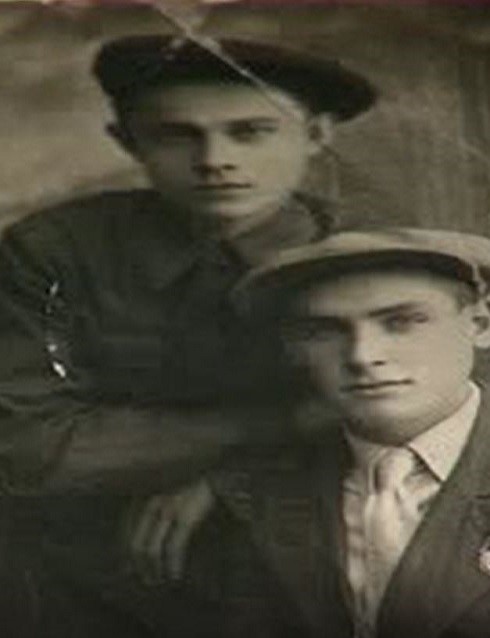Anatolii Yusim was born in 1920 in Sharhorod, southwestern Ukraine. He was the eldest of four siblings. His father Aron was a tailor, while his mother Miriam was a homemaker; the family was poor. Anatolii finished a seven-year Yiddish school and continued to study at a ten-year Ukrainian school. After finishing it, Anatolii completed a course for elementary school teachers and went on to work as a teacher in a local village for a year. In September 1939, Yusim was drafted into the Red Army. In 1940, he was sent to the town of Horodenka in the recently annexed eastern Poland (present-day Western Ukraine), to serve as a mortar gunner. That same year, his regiment (the future 58th Rifle Regiment) took part in the Soviet occupation of Czernowitz (Cernăuți, Romania; present-day Chernivtsi, Ukraine). After this military operation, the regiment was returned to Horodenka. Several days before the outbreak of the Soviet-German War, Yusim's regiment was transferred to the Carpathian Mountains, to serve on the new border with Hungary and German-occupied Poland. From the first day of the war, June 22, 1941, his unit took part in the fighting against the advancing Germans and Hungarians. The regiment was able to hold the positions along the border for eight days, whereupon it was ordered to retreat. On August 12, the lightly wounded and shell-shocked private Yusim was taken prisoner by the Germans.
In the first days of his captivity, having seen the Germans shoot Jewish POWs, the fair-haired and blue-eyed Anatolii Yusim realized that he had to escape before he fell into the clutches of the Nazi "race specialists". He was able to do so during a transfer of POWs between camps; his long trek to his native Sharhorod began. At that time, Sharhorod was under Romanian occupation, having become part of the newly-established Transnistria Governorate. The Romanians were less radical than the Germans in their approach to the "Jewish question", and Yusim, along with his family, survived the Sharhorod Ghetto. Anatolii joined an underground resistance cell in his native town. At first, the activities of this organization were limited to listening to Soviet radio broadcasts and spreading the news about the military situation among the ghetto inmates; later, in 1943, its members began to steal weapons and smuggle them to the local Soviet partisan unit. This unit, which admitted quite a few ghetto Jews into its ranks, left Yusim as its liaison in Sharhorod.
In March 1944, Sharhorod was liberated by Soviet troops. Yusim was once again drafted into the Red Army; however, the Soviets did not trust him, since he was a young male Jew who had survived under enemy occupation (albeit the Romanian one). Along with other young male Jews from Sharhorod, he was sent to the 177th Filtration Camp. Yusim's screening lasted eight months (during which he and his comrades worked at a military plant). Yusim demanded to be sent to the frontline. However, in December 1944 he was left behind in the camp – albeit as a clerical worker, rather than an inmate. Paradoxically, Yusim's clerical work at the filtration camp was officially considered a continuation of his military service. After the end of the war in 1945, he was discharged from the Red Army.
Anatolii Yusim received no military decorations in the course of the war, but he was awarded the medal "For the Victory over Germany" immediately after its conclusion. In 1957, he also received the Order of Glory, 3rd class, for his contribution to the partisan struggle.
After the war, Yusim lived in Moscow, working in the city's administrative apparatus. In 1994, he immigrated to the USA, settling in Los Angeles. He died in Santa Monica, CA, in 2015.







